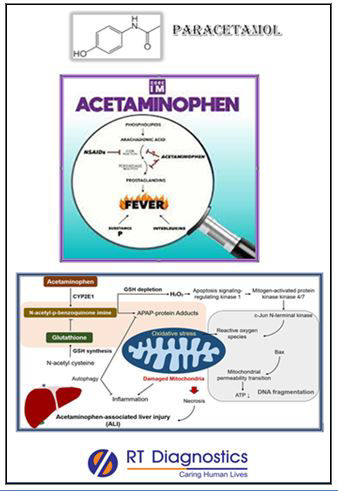Acetaminophen (Paracetamol)
Acetaminophen is also known as Paracetamol which is well-known for relieving pain and reducing fever. This test evaluates the drug levels in the blood to diagnose overdose and accidental cases causing toxic complications.
ACETAMINOPHEN (Paracetamol):
CLINICAL INFORMATION :
Acetaminophen is also called paracetamol. The test for acetaminophen is used to measure the level of drug in the blood to establish the diagnosis of overdose (over-the-counter medication), hence accesses the risk of liver damage. These blood levels of excessive medication of acetaminophen will decide the treatment modalities of antidote (N-acetylcysteine) to be used to minimize its toxicity since prompt diagnosis and treatment are important for a positive outcome. Usually, diagnosis of acetaminophen toxicity is usually confirmed through diagnostic tests which include levels of acetaminophen, electrolytes, kidney function test, amylase, lipase, liver function test, jaundice, ultra-sound for liver (hepatomegaly), coma (hepatic encephalopathy), and complete blood count along with coagulation factors. The adverse effects of acetaminophen are nausea, stomach pain, loss of appetite, itching, rash, headache, dark urine, and clay-colored stool.

General instructions:
Sample Requirement: Specimen - Blood sample drawn from the vein. Test Preparation: None.
NOTE - Sample for specimen collections may vary based on the patient’s condition/cases according to the patient’s presentingcomplaints / signs or symptoms:
SPECIMEN REQUIREMENT (Special or Rare Cases) - As instructed and guided by Physician / Clinician / Pathologist / as per Laboratory’s requirements, according to procedures and protocols.
This Multi-Specialty Clinical Referral Laboratory “RTDIAGNOSTICS” provides precise and accurate tests with an extensive range of testing services to the medical centers to help in the diagnosis and identification of pathology in the test specimens for infectious diseases and also to evaluate the function of organ systems of the patient. It prevents further complications and helps to stabilize and restore health to near normalcy at the earliest without delay.



